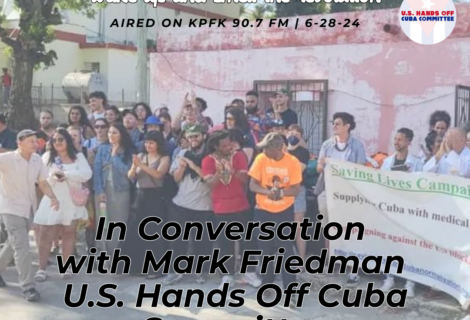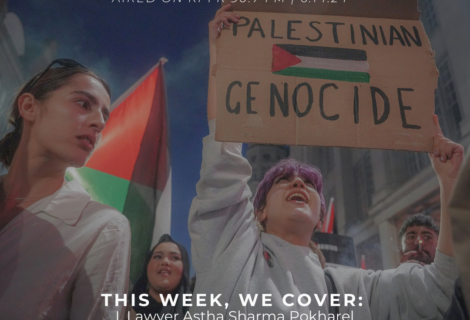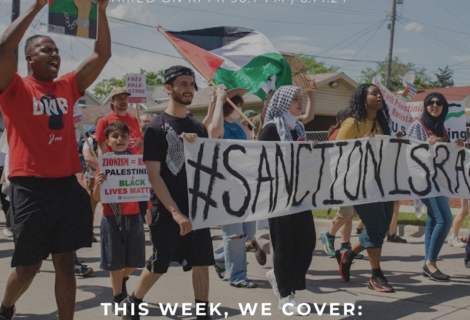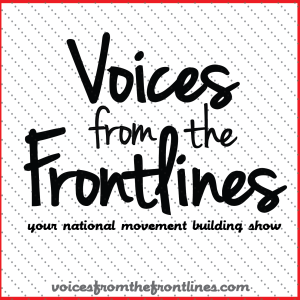Voices Radio: Eric and Channing honor and pay a heartfelt tribute to the great John Lewis and Julian Bond!
This week on Voices From the Frontlines, I had a wonderful reunion with some Voices listeners, and as we celebrate the life and mourn the death of civil rights giant John Lewis, I choose to also celebrate the life and mourn the death of Julian bond, as the two of their lives were deeply intertwined. John Lewis died on July 17, 2020. Julian Bond died on August 15, 2015.
John Lewis, along with Julian, was a founder of the Student Nonviolent Coordinating Committee. He was an influential member of Congress and the subject of many books and films—including the excellent just-produced John Lewis, Good Trouble. The film recounts the historic race for the U.S. Congress in 1986 in which John Lewis defeated Julian Bond.
Bond had won a seat in the Georgia state legislature in 1965% but the racist body refused to seat him because of his endorsement of SNCC’s statement opposing U.S. involvement in the Vietnam War. The voters in his district reelected him in both a special election and a regular election in 1966, but the legislature barred him each time. Finally, in December 1966, the U.S. Supreme Court ruled the exclusion unconstitutional, and Bond was sworn in on January 9, 1967. In the film, it brings back the historic race for Congress between two old friends and comrades, Bond and Lewis, and explains, painfully, some of the conflicts between them. Also, Lewis makes clear he rejected the teachings of Malcolm X, rejected Black nationalism, and also rejected the concept of Black Power put forth at the time by Stokely Carmichael and Willie Ricks at the time. It also makes it clear that Bond, who had been elected to the Georgia State Legislature, was favored by Black voters by a 60% to 40% margin over Lewis. But Lewis received 80% of the white vote and Bond only 20% that created Lewis’ margin of victory.
In 1986, Lewis and Bond ran for a newly created Black congressional district that Bond had helped create through is role in the Georgia Legislature. The purpose of today’s show is to appreciate both men, to grasp that in a Black united front we need many different points of view and conflict and controversy are as normal as the sun rising in the morning and setting in the evening. I will work to appreciate both great men. On this day, however, I choose to also uplift the politics and persona of Julian Bond.
“June 2014 I went to Jackson, Mississippi to celebrate the 50th Anniversary of Freedom Summer–one of the great periods in U.S. and Black revolutionary history. Thanks to the support of Alan Minsky, the program director of KPFK Pacifica in Los Angeles and my own organization, the Labor/Community Strategy Center, went to Mississippi to conduct a series of interviews/conversations with veterans of the civil rights movement and to broadcast them within days of the event. I worked with Julian Lamb of the Strategy Center and film-makers Catherine Murphy and William Sabourin in what turned out to be intense, exhilarating 12 hour days of recording, filming, and editing.
In the summer of 1964, when Mississippi Summer was happening in real time, I had just graduated from Cornell and was working in a settlement house in the South Bronx with Black and Puerto Rican families. By the fall of 1964 I was a field secretary with the Congress of Racial Equality in Harlem and the Northeast and my life had already been shaped by the murders of Emmett Till, Medgar Evers, James Chaney, Andrew Goodman, and Mickey Schwerner – among the many Mississippi Martyrs. It was also shaped by the history-making organizing of CORE and the Student Non-Violent Coordinating Committee. When I met Dave Dennis, a field secretary for CORE in Mississippi in 1964 and, in Newark in 1965, Fannie Lou Hamer, I understood even at 21 that I was a soldier in the army but these were our generals–our true heroes and I was so lucky to be part of The Movement. I did not have the courage or the bravery to stand down the Klan or to go door to door among Black sharecroppers in Mississippi but I did go door to door in Harlem, Baltimore, D.C., and Newark in Black communities as part of the Civil Rights and Black Liberation Movement–and I am still doing so today in South Los Angeles.
During the Freedom Summer 50th Anniversary I taped conversations with Hollis Watkins, Dave Dennis, Derrick Johnson, Frankye Adams Johnson, Gwen Simmons, Mike Sayer, Dorothy Zellner, John O’Neal, Bob Zellner, and Danny Glover, Leroy Johnson, Beverly Hogan, and Julian Bond. Each of them told a magnificent story.
I remember the conversation with Julian so vividly. Strikingly handsome, Julian put forth every sentence so succinctly and carefully formulated, generous and ironic with a profound sense of history–an introspective and truly modest self. I was also struck by what a fierce warrior he was and how every story was one of struggle and confrontation with the forces of evil and the commitment to fight to win.
At the time I was struck by how so many of us who fought for civil rights, worked with SNCC and CORE, helped the Mississippi Freedom Democratic Party challenge in 1964 were still involved in The Movement in 2014 and how truly fortunate we were to have witnessed and made history. In Julian Bond’s case I was well aware I was talking with a true giant of the Civil Rights Movement.”
To hear this weeks Voices From the Frontlines episode, click on the Soundcloud link below.
To hear the entire interview with Eric Mann and Julian Bond, click on the Soundcloud link below.






